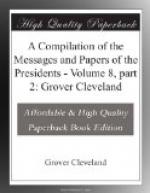A high tariff can never be permanent. It will cause dissatisfaction, and will be changed. It excludes competition, and thereby invites the investment of capital in manufactures to such excess that when changed it brings distress, bankruptcy, and ruin upon all who have been misled by its faithless protection. What the manufacturer wants is uniformity and permanency, that he may feel a confidence that he is not to be ruined by sudden changes. But to make a tariff uniform and permanent it is not only necessary that the laws should not be altered, but that the duty should not fluctuate. To effect this all duties should be specific wherever the nature of the article is such as to admit of it. Ad valorem duties fluctuate with the price and offer strong temptations to fraud and perjury. Specific duties, on the contrary, are equal and uniform in all ports and at all times, and offer a strong inducement to the importer to bring the best article, as he pays no more duty upon that than upon one of inferior quality. I therefore strongly recommend a modification of the present tariff, which has prostrated some of our most important and necessary manufactures, and that specific duties be imposed sufficient to raise the requisite revenue, making such discriminations in favor of the industrial pursuits of our own country as to encourage home production without excluding foreign competition. It is also important that an unfortunate provision in the present tariff, which imposes a much higher duty upon the raw material that enters into our manufactures than upon the manufactured article, should be remedied.
The papers accompanying the report of the Secretary of the Treasury will disclose frauds attempted upon the revenue, in variety and amount so great as to justify the conclusion that it is impossible under any system of ad valorem duties levied upon the foreign cost or value of the article to secure an honest observance and an effectual administration of the laws. The fraudulent devices to evade the law which have been detected by the vigilance of the appraisers leave no room to doubt that similar impositions not discovered, to a large amount, have been successfully practiced since the enactment of the law now in force. This state of things has already had a prejudicial influence upon those engaged in foreign commerce.




